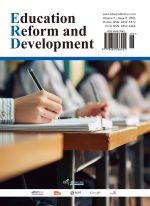Abstract
With the popularization and development of the Internet, the problem of Internet addiction among rural middle school students has become increasingly prominent, exerting adverse effects on students’ physical and mental health, academic performance, and family relationships. This study aims to deeply analyze the causes of Internet addiction among rural middle school students and explore effective countermeasures. The investigation reveals that Internet addiction is closely related to multiple factors, including the family environment, school education, social atmosphere, and personal traits. It should start from multiple levels to jointly construct a system for preventing and treating Internet addiction among rural middle school students.
References
Li F, Sun J, He J, et al., 2017, Analysis of the Current Situation and Influencing Factors of Internet Addiction among Middle School Students in Henan Province. Chinese Journal of School Health, 38(9): 1342–1344.
Ai Z, 2024, The Causes and Governance Countermeasures of Distorted Online Values Behavior of Teenagers from the Perspective of Information Cascade. International Public Relations, 2024(23): 137–139.
Dai Y, Yuan B, 2009, Analysis of Internet Addiction Tendency and Its Influencing Factors among Adolescents in Jiangsu Province. Chinese Journal of School Health, 30(4): 328–329.
Chen Z, Song H, 2017, Psychological Factor Analysis and Behavioral Intervention of Internet Addiction among Rural Registered Middle School Students. Chinese Rural Health Service Administration, 37(4): 450–451.
Yang J, 2025, Investigation and Response to the Current Situation of Primary and Secondary School Students’ Internet Use. Modern Teaching, 2025(Z2): 40–45.
Hao X, Song H, Song H, et al., 2025, Cumulative Ecological Risk Factors of Internet Addiction and Sports Intervention among College Students. Journal of Mudanjiang Normal University (Natural Science Edition), 2025(1): 71–75.
Mai S, 2025, Analysis and Prevention Countermeasures of Internet Addiction Problem of Rural Left-behind Teenagers. Guangdong Science and Technology News, 2025-02-14(011).
Yuan L, Zhang Z, Zhou X, et al., 2024, The Correlation between Stress and Internet Addiction among Middle School Students in Shanghai. Chinese Journal of School Health, 45(12): 1757–1760 + 1765.
Xing H, Pan K, 2024, Analysis of Corrective Countermeasures for Teenagers’ Internet Addiction – Based on Plato’s “Turning of the Soul”. Western Journal, 2024(21): 151–156.
Yang Q, Zhang X, Yang T, et al., 2024, Analysis of Internet Addiction Status and Related Factors of Junior High School Students in Inner Mongolia. Chinese Journal of School Health, 45(10): 1455–1459.
Shi W, Ruan X, 2024, The Relationship between School Exclusion and Internet Addiction of Junior High School Students: The Chain Mediating Role of Self-esteem and Forgiveness Tendency. Journal of Shangrao Normal University, 44(3): 76–83.
Pan F, 2022, Research on Internet Addiction of Rural Junior High School Students. Education Circle, 2022(22): 92–94.
Li J, Ni X, 2020, The Current Situation and Intervention Strategies of Internet Addiction of Rural Left-behind Junior High School Students – Based on the Case Investigation of L Junior High School in Laiyang City. Modern Communication, 2020(11): 41–42.
Liu M, 2018, Research on the Relationship between Internet Addiction and Self-control of Rural Junior High School Students, thesis, Hebei University.
Chen Z, Song Q, 2017, Psychological Factor Analysis and Behavioral Intervention of “Internet Addiction” of Middle School Students with Rural Household Registration. Zhejiang Provincial Preventive Medicine Association. Compilation of Materials of the Fifth Zhijiang Public Health Forum of Zhejiang Provincial Preventive Medicine Association, Department of Psychology, Lishui Second People’s Hospital: 308–311.
